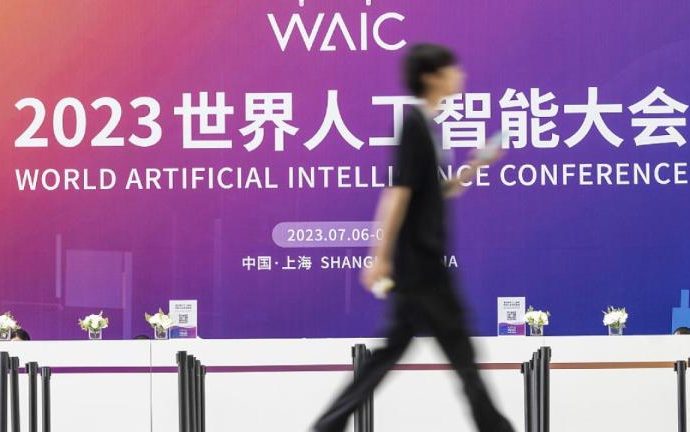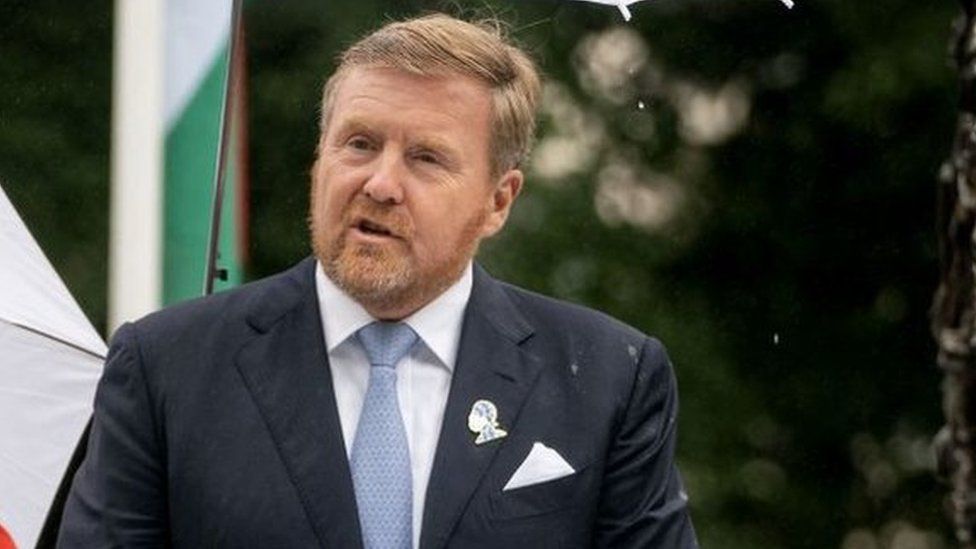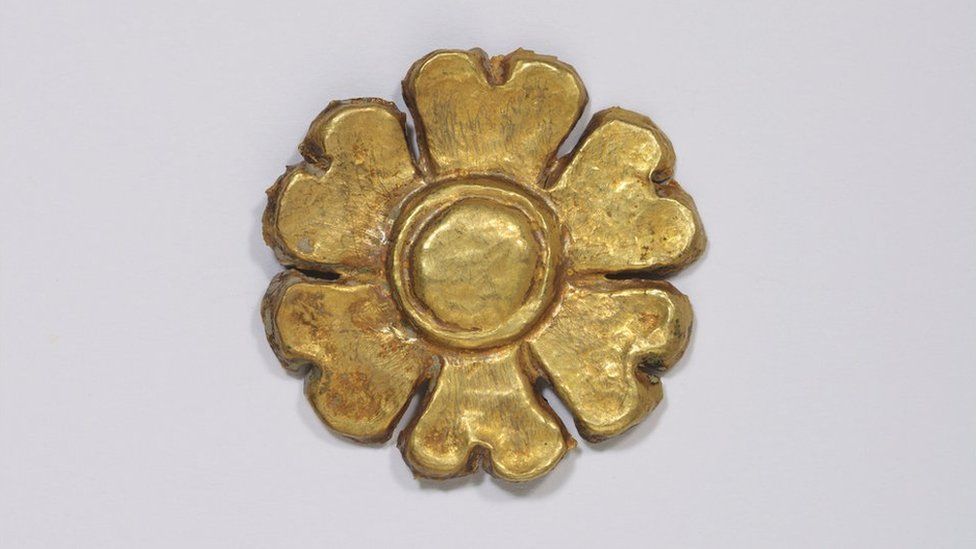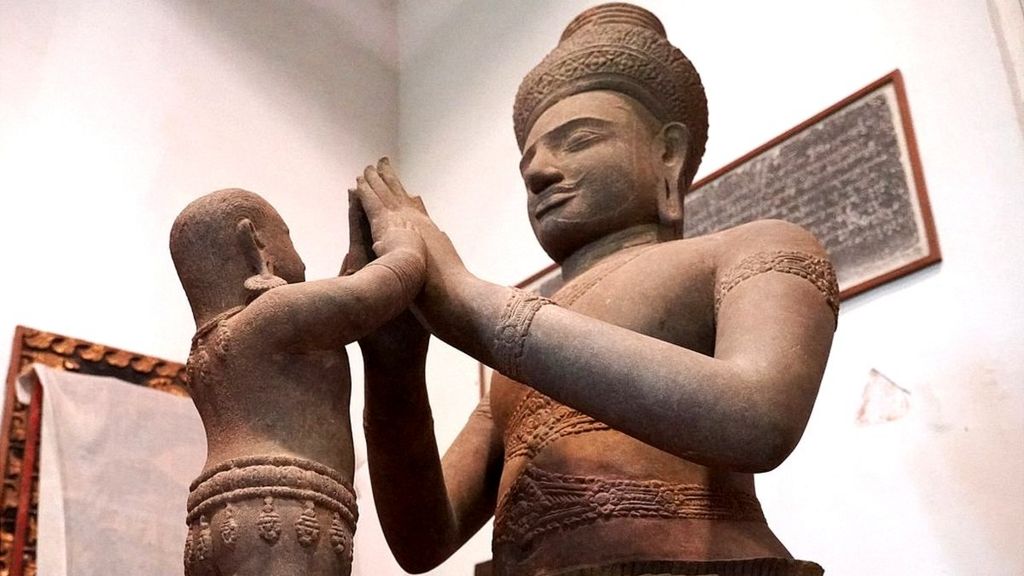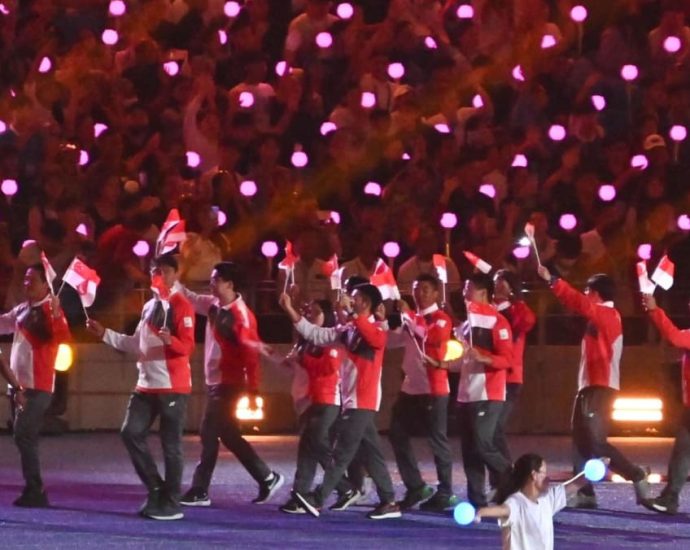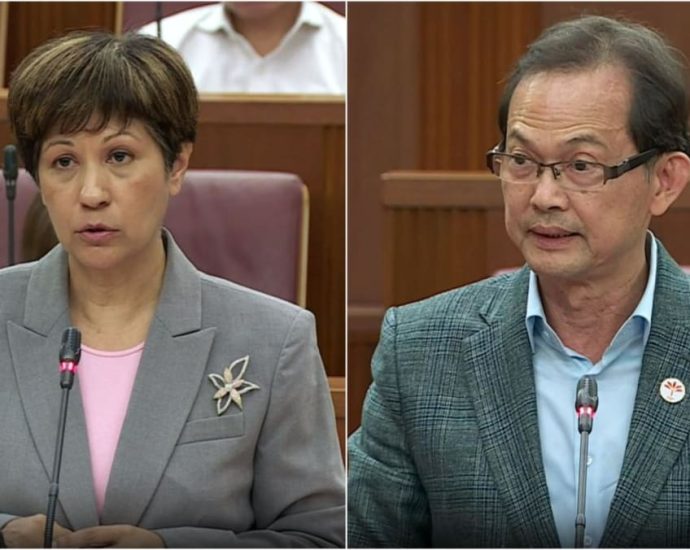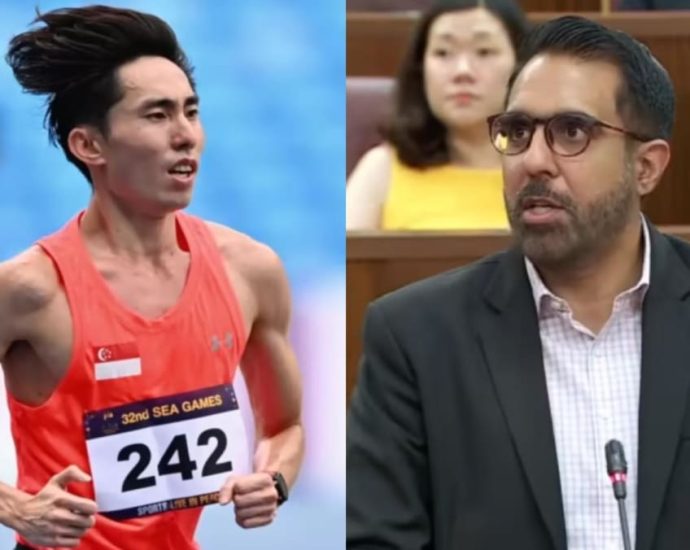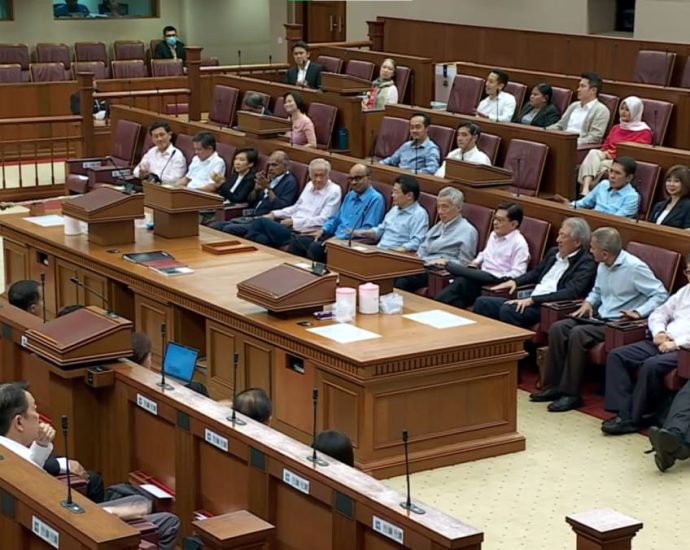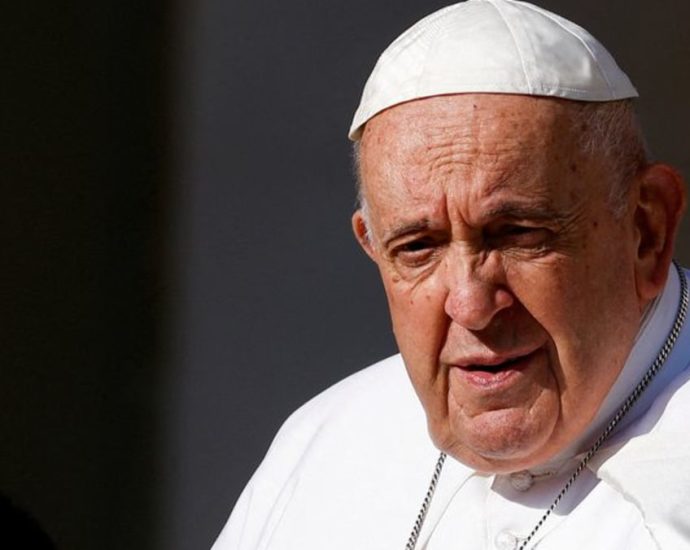Coco Lee: Death of pop icon sparks mental health discussion in China
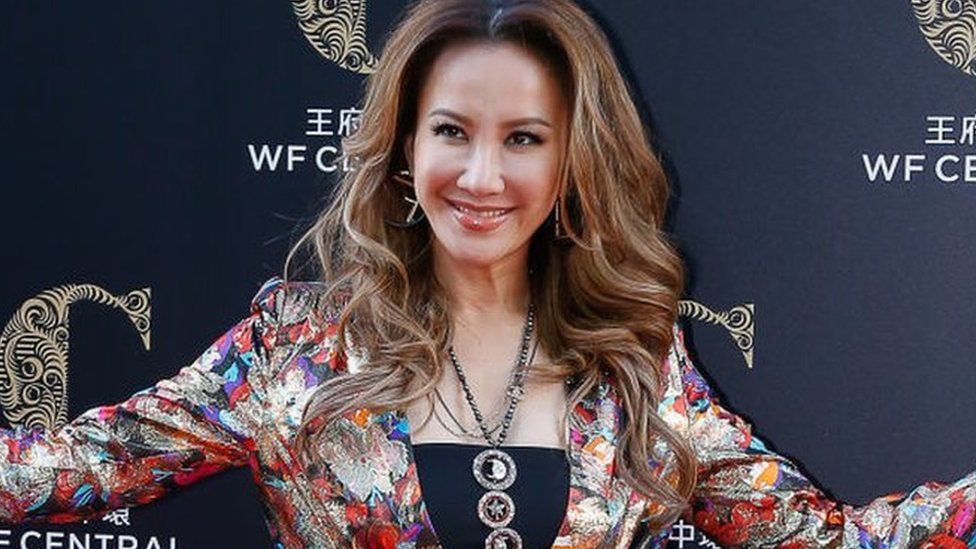 Getty Images
Getty ImagesPop singer Coco Lee’s death has shocked the Chinese-speaking world, and sparked discussions of mental health issues on China’s social media.
Lee passed away after being in a coma since attempting to take her own life on the weekend, according to a Facebook post from her older sisters Carol and Nancy. She was 48.
They also disclosed that she had been suffering from depression in recent years.
A household name in China, the Hong-Kong born American singer was remembered for her electrifying energy and megawatt smile on stage and in front of the public. And many people were in disbelief after the news broke late at night on Wednesday.
“I can’t believe this. She was always the sunshine girl who loved to sing, dance and smile,” a comment liked by more than 3,000 times on the country’s Twitter-like platform Weibo reads.
“Is there still any happy person in this world then?” said another top-liked comment.
As tributes poured in, many focused on the mental health issue her family had mentioned.
Hashtags such as “how close depression is near you”, “symptoms of depression” have been trending on different online platforms, state media outlets like CCTV, People’s Daily and China Daily have put out content to raise people’s awareness of depression and mental illness.
“People can feel this has apparently become a more and more pressing matter,” says Dr Jia Miao, assistant professor of sociology at Shanghai New York University.
It is symptomatic of an alarming situation facing China: a rapidly growing number of people suffering from mental health issues, and a medical network not yet fully ready to cope.
Depression, or any mental illness, has long carried stigma in Chinese society. The Chinese word for mental illness, ‘jingshen bing’ sounds similar to a derogatory term for a mad person, ‘shenjing bing’, and people who have mental health issues would always be seen as someone out of their minds.
Chinese patients were largely underdiagnosed, according to Ke Ren, founder of social media account “Depression Research Institute”.
“We would hear things like ‘someone didn’t get a good grade at school so they jumped off the building’,”says Ms Ren. “But we never got a chance to ask those people ‘what happened?’, and what kind of help they needed.”
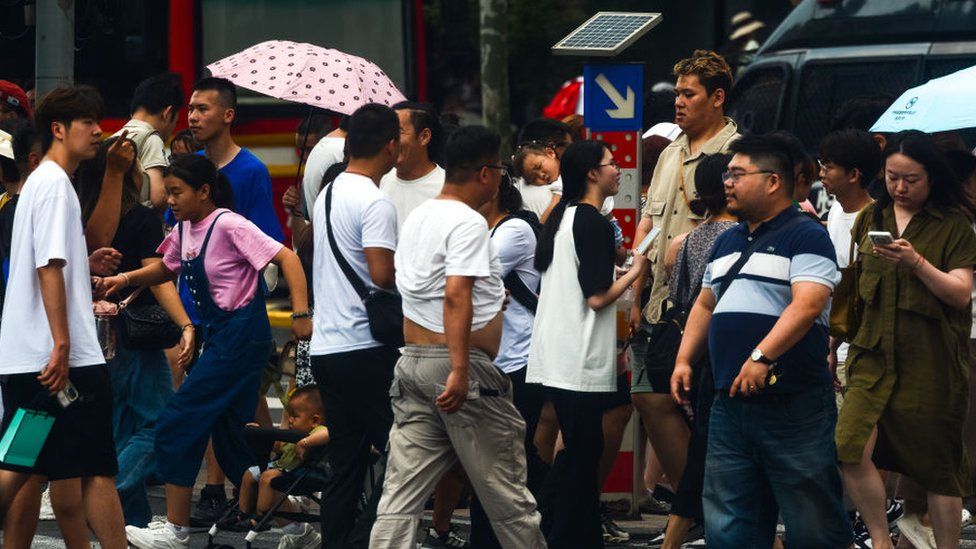
Over the last 10 to 15 years, as China’s economy quickly advanced, pressure on individuals have increased.
Chinese people have been burnt out as competitions at school and in the workplace have become more fierce, and mental health issues have gained attention from society, said Dr Miao from Shanghai New York University.
“As more people found themselves suffering from these issues, they became more willing to share their experiences with their family and friends, and seek professional help, and that changed the attitude towards this topic,” she added.
Numbers show that China’s depressed population has risen sharply. According to China Mental Health Survey which was released in 2019, one in every seven Chinese residents would suffer from at least one type of mental illness in their lifetime.
Even people who are widely seen as successful began to share their experiences.
In an article published in 2015, Ren Zhengfei, founder of tech giant Huawei, revealed he had once suffered from severe depression and anxiety. Zhang Chaoyang, founder of tech company Sohu, has addressed his past experience of depression several times openly.
The pandemic and China’s extremely strict “zero-Covid” policy have also taken a toll on people.
“Mental health issues occurred during the pandemic. [Trouble with] people’s income, trouble to find a job – people’s anxiety has always been there, and is even increasing,” Dr Miao said.
Earlier this year, the death of four young people by suicide at a famous tourist attraction in Hunan province sparked fierce discussion about mental health and social pressure in China.
The Chinese government has been trying to tackle this.
Dr Miao explained schools and universities are now required to have mental health consultants, and in big cities community units have designated people to look after elderly people’s mental health.
But one of the most pressing matters is that there are not enough qualified professionals. There were only 64,000 psychiatrists in China by the end of 2021, according to state media China Youth Daily.
“Compare to the fast pace of social awareness, the country has a long way to go on diagnose and treatment in terms of mental health illnesses,” added Dr Miao.
For information and support about any issues raised in this story contact the BBC Action Line
-
-
14 June 2021
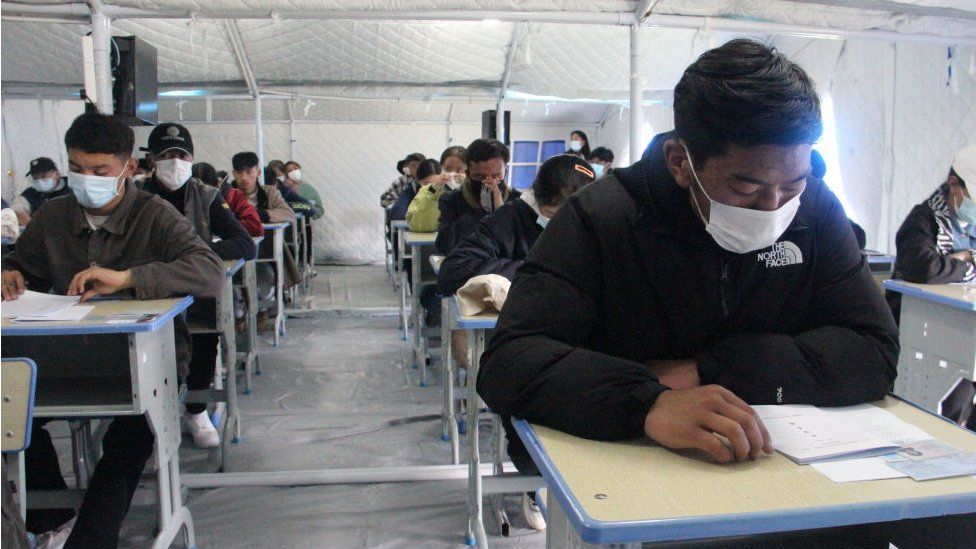
-
-
-
15 hours ago

-
Chip war may thwart Shanghai plans to build AI hub
The Shanghai government is stepping up its efforts to attract artificial intelligence (AI) talent and investments and improve regulations with the objective of building a world-class AI hub in Pudong.
Top Shanghai officials said in the World AI Conference on Thursday that the largest commercial city in China – which hosts the conference – will gather and groom AI experts to strengthen research and development and promote the use of AI technologies in the advanced manufacturing, urban management and robotics sectors.
However, Shanghai may face a hardware problem starting later this month, as the Biden administration is set to ban exports of Nvidia’s A800 and H800 AI chips to China soon and also restrict US investment funds from putting money into China’s high-technology sector.
In recent years, China’s Huawei Technologies and Cambricon Technologies have launched their AI chips, which are said to run at speeds of 60-to-70% that of Nvidia’s A100 chip. But the manufacturing of these chips is now done by Taiwan’s TSMC and can be affected by the prospective US curbs.
Supportive measures
On May 25, the Shanghai government in a document called upon private capital to invest in new infrastructure. It said it will extend the implementation period of its policy to provide an interest subsidy of up to 1.5 percentage points to private firms that build AI facilities.
It said integrated circuit, biomedical and AI sectors are the three most important industries that will build the “Shanghai high ground.”
Currently, Chinese AI firms can still buy A800 and H800 chips, which were introduced by Nvidia last November after the company’s A100 and H100 chips were added to a US export control list last August. It is said that A800’s performance has reached 70% of the A100’s.
Media reports said last week that the US Commerce Department may also ban the exports of A800 and H800 chips to China soon. The announcement reportedly would be made after US Treasury Secretary Janet Yellen’s four-day Beijing trip ends on July 9.
Ken Hu, rotating chairman of Huawei, said on Thursday that the company has been working hard developing AI chips and industrial applications in recent years.
Hu said both Huawei’s Ascend AI chips and Kunpeng central processing units (CPUs) have already made some key breakthroughs.
According to a research report published by CITIC Securities on Tuesday, more than 20 Chinese cities have used Ascend chips in their AI facilities while Huawei now has a 79% share in China’s AI computing center market.
Some media reports said Ascend 910’s performance is about 70% of that of the A100 while Cambricon’s Siyuan 370’s performance is about 60-70% of the A100. Both chips are manufactured in Taiwan using TSMC’s advanced 7nm technology.

Made in Taiwan
In May 2019, the US Commerce Department put Huawei and its 70 affiliates on its so-called entity list, on national security grounds. Huawei then started using inventory chips plus self-developed Kirin chips to maintain its smartphone output.
In September 2020, Taiwan’s TSMC stopped producing Kirin chips. In the third quarter of last year, Huawei ran out of its high-end processors and could no longer produce 5G-capable phones.
A Hainan-based columnist published an article last month with the title “Huawei’s Ascend 910 chip is leading in AI computing. Why is it not affected by the US sanctions?”
“Why can TSMC still make Ascend 910 chips but not Kirin 5G ones for Huawei? It’s because they used different technologies,” he says in the article.
He says Ascend 910 used Huawei’s self-developed Da Vinci architecture while Kirin chips used the United Kingdom’s ARM architecture, as well as technologies of the United States’ Cadence and Synopsys.
He adds that TSMC is a Taiwanese foundry, not an American firm, so it enjoys some space to maintain a business relationship with Huawei.
But a Fujian-based writer says that, even if TSMC can continue to produce AI chips for China, Chinese firms lack the tools to develop more advanced AI chips amid the US curbs and will be left behind by Nvidia.
In May, Nvidia said it will hire 1,000 people and invest up to TWD24.3 billion (US$790 million) in its new AI research center, or AI University, in Taiwan.
World AI Conference
The WAIC has been held in Shanghai annually since 2018. This year’s event attracted a lot more attention as the AI sector has become popular after the Microsoft-backed OpenAI unveiled ChatGPT 3.5, an AI chatbot, last November. Share prices of Nvidia, which has a more than 80% share in the AI chip markets, have grown 196% so far this year.
“There is a tremendous number of very smart and talented people in China,” Tesla founder Elon Musk said in a video shown during the WAIC. “The Chinese can be great at anything if they set their minds to, not only in many sectors of the economy but also in AI. I believe that China will have strong AI capabilities.”
“We will create a good atmosphere for gathering AI talent from all over the world, and accelerate the training of a group of top-notch and urgently-needed talents,” Shanghai party secretary Chen Jining said in opening speech at the WAIC. “We will adhere to open collaboration, build a platform, encourage cooperation, and create an open-source and innovative ecology.”
“We will actively explore the application practice of general AI technologies in vertical fields such as advanced manufacturing and urban management, and accelerate the development of embodied AI and robotics industries,” Chen said. “The government will strengthen safety supervision and continue to improve the AI governance and application standards.”
Shanghai Mayor Gong Zheng said Shanghai must firmly grasp the wave of new technological revolutions such as AI to upgrade its industries and turn itself into a socialist modern international metropolis with world influence. Gong said the city aims to build a high ground for itself in the AI industry.
Read: Sanctions starting to bite Huawei 4G chips sourcing
Read: Nvidia to turn Taiwan into a world-class AI hub
Follow Jeff Pao on Twitter at @jeffpao3
Netherlands to return treasures to Indonesia and Sri Lanka
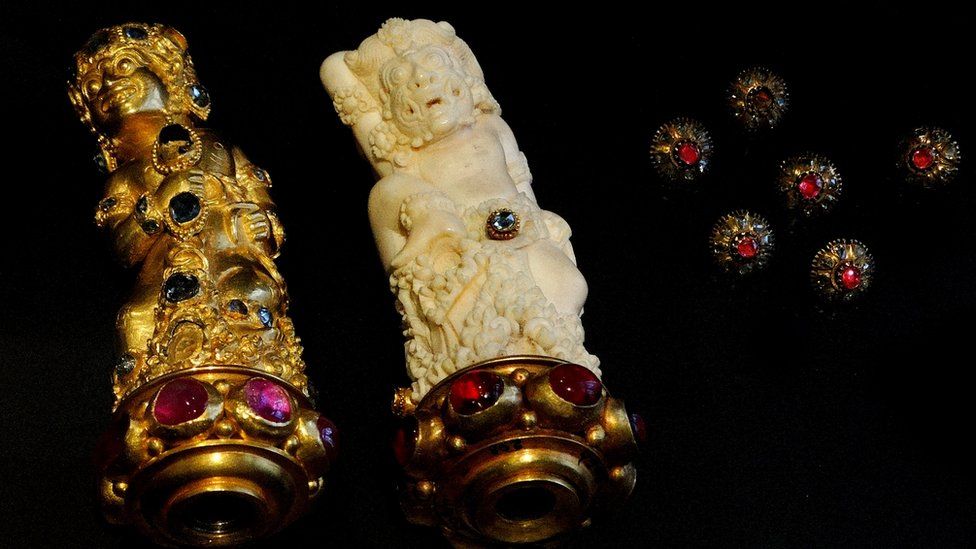 Getty Images
Getty ImagesThe Netherlands is set to hand back hundreds of precious artefacts taken from Indonesia and Sri Lanka during its colonial period.
Objects to be returned include a gem-encrusted bronze cannon and a looted cache of jewels from the “Lombok treasure”.
A report had urged the government to return items if countries request them.
The agreed restitution comes as the Netherlands increasingly confronts its colonial past.
Other countries have also began returning precious looted artefacts in recent years . Notable examples include British and German museums signing over some of the so-called Benin Bronzes stolen from Nigeria during a large-scale 1897 British military expedition.
“[This is] the first time that we are returning objects that should never have been in the Netherlands,” Culture Minister Gunay Uslu said.
“But we are not just returning objects. We are actually starting a period in which we are more intensively cooperating with Indonesia and Sri Lanka.”
Among the collections to be handed back to Indonesia is the so called “Lombok treasure” – a trove of jewels, precious stones, gold and silver which was looted by the Dutch colonial army from a royal palace on Indonesia’s Lombok island in 1894.
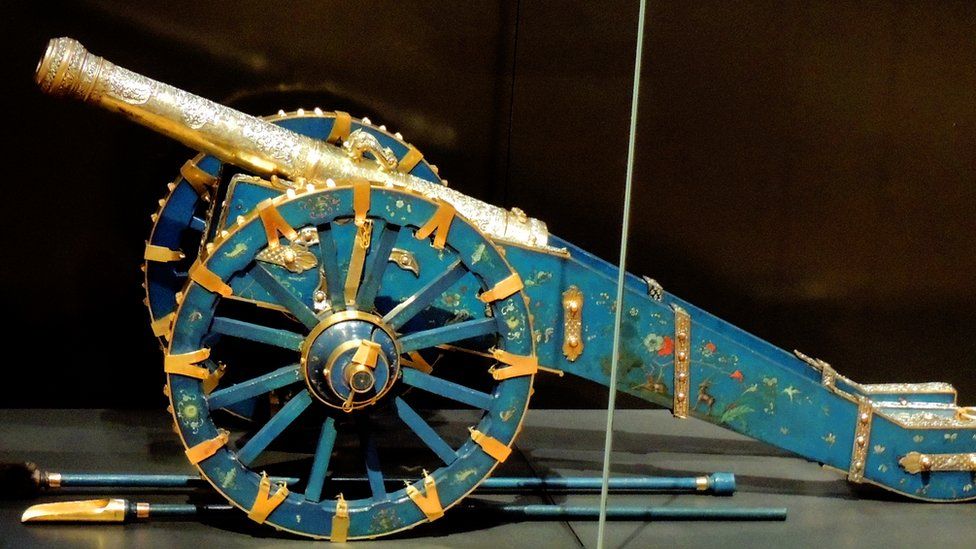
Sri Lanka will take back a lavishly decorated 18th Century bronze cannon, currently on display at Amsterdam’s Rijksmuseum, thought to have been a gift from a Sri Lankan aristocrat to the King of Kandy in the 1740s.
The cannon is believed to have fallen into Dutch hands in 1765, when Dutch troops attacked and conquered the Sri Lankan kingdom of Kandy.
Culture Minister Uslu said the government was acting on recommendations laid out in a 2020 report by a Dutch committee investigating art taken during the colonial era.
The committee urged the government to be “willing to return unconditionally” any cultural objects looted in former Dutch colonies if requested by the source country.
“The Netherlands must assume responsibility for its colonial past by making the recognition and redress of this injustice a key principle of the policy on colonial collections,” the report said.
The country has been wrestling with its legacy more openly in recent years.
On Saturday, King Willem-Alexander formally apologised for the Netherlands’ role in the slave trade, saying he felt “personally and intensely” affected.
The country became a major colonial power after the 17th Century, holding territories across the globe, and Dutch slave traders trafficked more than 600,000 people.
Related Topics
-
-
19 December 2022
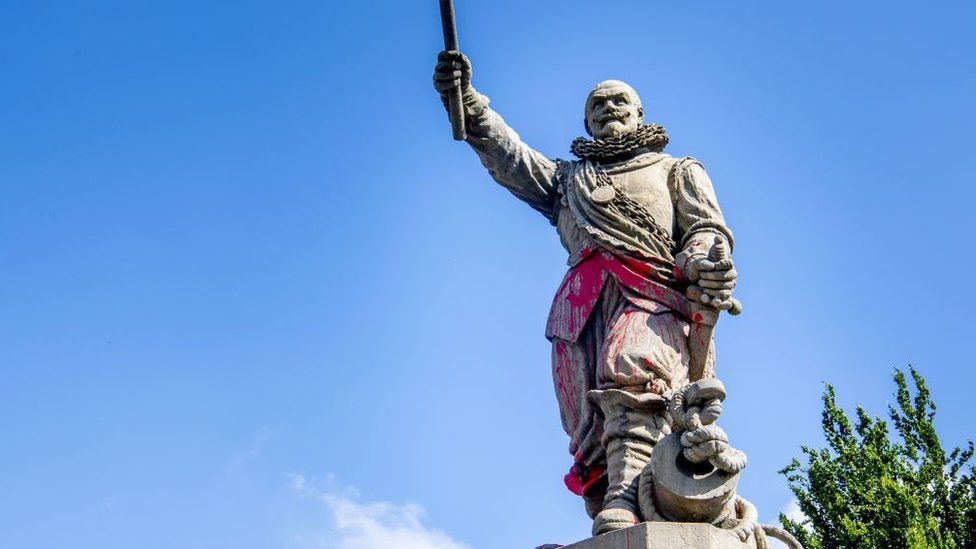
-
Parliament votes in favour of amended WP motion on supporting Singapore’s athletes

SINGAPORE: Members of Parliament on Thursday (Jul 6) voted in favour of a Workers’ Party motion to support the accomplishments of Singapore’s athletes and para-athletes, but stopped short of agreeing to call on the government to re-evaluate its management of sports.
Beyond supporting Singapore’s athletes, the original motion called on the government to “undertake a thorough evaluation of the areas of improvement in Singapore’s sporting ecosystem” and “commit to realising clear, achievable goals for sporting success over the coming decade”.
MP Darryl David (PAP-Ang Mo Kio) proposed to amend the motion to reflect that the government would instead “continue its thorough evaluation”. He also proposed changing “clear, achievable goals for sporting success” to “our goals in sports”.
All MPs from WP and the Progress Singapore Party’s Non-Constituency MPs who were present voted against these two amendments. The amendments were passed with a majority.
The majority of the house then voted in favour of the amended motion, while all MPs from WP and PSP’s NCMPs who were present voted against the amended motion.
In his closing speech, Associate Professor Jamus Lim (WP-Sengkang) said WP could not support Mr David’s amendments in full, though it would be willing to “stand corrected”.
“While we accept that the government has indicated that they have performed a number of reviews and continues to monitor performance, we’ve not seen the concrete fruits of such thorough evaluations for the sporting ecosystem as a whole,” he added, calling for the government to commit to releasing a report or review documenting this effort.
The party also did not support the other amendment because it “wiggles out of one of the most important fundamentals for sporting performance” – appropriately defining success, said Assoc Prof Lim.
“It is important to have clarity on what our goals are, and ideally set up not only eventual but also intermediate targets that we can credibly achieve,” he added.
“Accepting the amendment also robs us of being able to meet the sort of mass participation goals that we alluded to that are imminently achievable. We also doubt that the government would be comfortable with such ambiguity for other endeavours.”
Based on Singapore’s income, the country has “unfortunately not only punched way below our weight” in terms of sporting achievements, but has “consistently gotten worse”, said Assoc Prof Lim in his opening speech.
“What explains our nation’s anomalous outcomes? As it turns out, money alone is not enough. Countries that have prioritised sporting achievement, including at the highest level, know that this prioritisation is what is important,” he added.
During the five-hour debate, Senior Parliamentary Secretary for the Ministry of Culture, Community and Youth Eric Chua supported the amended motion, and stressed that regular and consistent reviews are conducted as part of Singapore’s high-performance sports ecosystem.
“Through our review, we examine what has worked, what has not worked, what we could do differently and chart our future priorities,” he continued.
“Our goal is to win of course, but we must accurately define what winning is.”
While Singapore cannot compete directly with countries with large populations, it has also performed well in many sports, including swimming, sailing, table tennis, badminton and silat.
Recalling a previous conversation with national badminton player Loh Kean Yew about the expectations Singaporeans have for him, Mr Chua called for the country to be more sensitive and supportive.
“The weight of an entire nation’s expectations was squarely on this young man’s shoulders, and he was fully aware of that. Perhaps overly so,” he added.
Mr Chua urged Singaporeans to “not forget that it is not all just about medals”.
“Rather, it is about journeying with our athletes as they work through their daily struggles in realising their maximum potential.”
PSP apologises for ‘misleading’ video on Ridout Road parliament debate
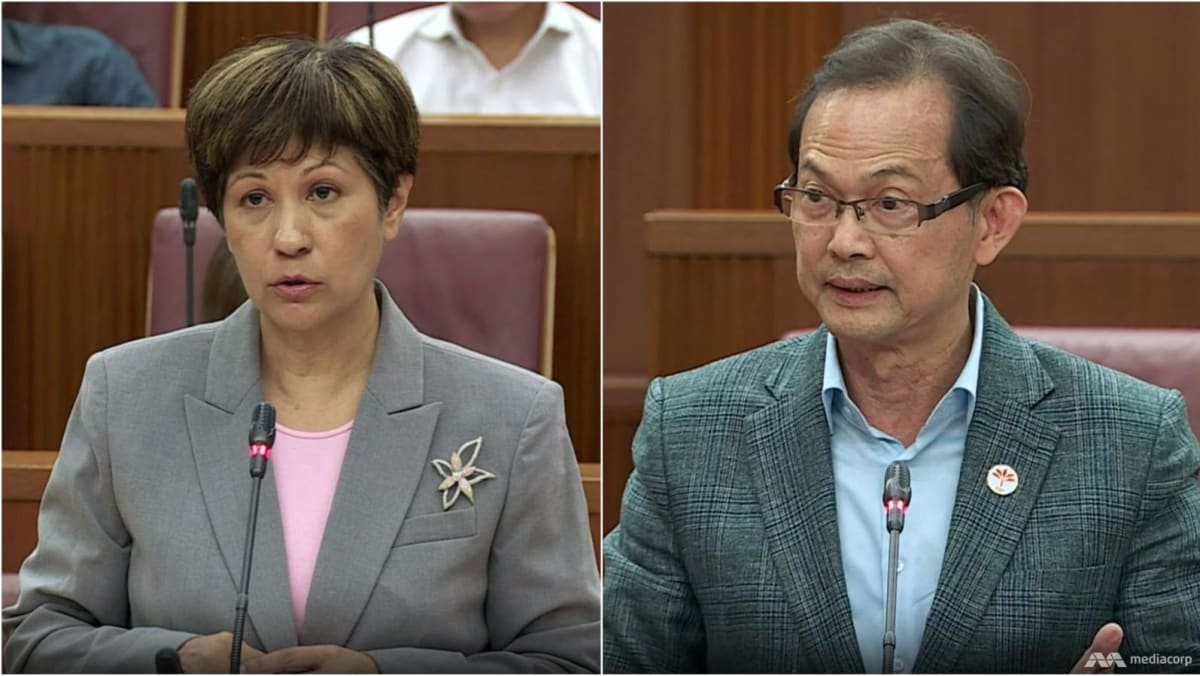
Ms Indranee said she had written to the PSP to formally request that Mr Leong and the party remove the revised Facebook post and edited video put up on Thursday morning, and to post an apology on all the social media pages the video had appeared on by 10pm the same day.
Otherwise, she would have had “no choice” but to refer the matter to the Committee of Privileges, said Ms Indranee.
In parliament, Mr Leong tried to argue his case by pointing out that the PSP had removed inaccuracies about how much time was spent on clarifications. He also reiterated that Ms Indranee had misunderstood who the “sia suay” phrase in the video’s caption referred to.
“Sia suay” is a Hokkien expression to indicate embarrassment or disgrace.
The edited post had read: “In what some online commenters are calling another ‘sia suay’ moment by our NCMP Leong Mun Wai –
“Our NCMP Leong Mun Wai was informed by the deputy speaker that members were allowed to seek clarification but not debate about the ministerial statements concerning the Ridout Road incident.
“The PSP’s Leong Mun Wai & Hazel Poa Koon Koon are here to do whatever it takes to ensure that the voice of the people is heard.
“This short video is an excerpt taken from the full parliamentary session and is not to be taken as a representation of the entire discussion that took place in the House on Jul 3, 2023.”
In the House on Thursday, Mr Leong said: “We should be entitled to a different view … We should not be forced to present only the view that you want to present. This is a democratic parliament, not a rubber-stamp parliament.”
He also asked Ms Indranee to confirm if an apology was necessary if PSP took down the video, as the party did not “impugn” anyone and he was of the view there was no requirement to say sorry.
Mr Leong also proposed putting up an open letter to express their regret on the matter.
Ms Indranee said sternly that an apology was needed. “The reason is this: The parliamentary privileges, the conduct of parliament are important things. They underpin our democracy.”
She added that for a democracy to function properly, it must work on the basis that MPs and their political parties will speak truthfully to people and give accurate representations of what happened in parliament.
“Because that determines the kind of society we are and if you have a political party which has misrepresented what has happened in parliament, which is a direct strike at the values that underpin this parliament, you should apologise because it’s not the right thing to do.”
Pita invites Taylor Swift to Thailand
Aspiring PM tells pop star who cancelled after 2014 coup that country is ‘fully democratic’ now

Taylor Swift is coming to Southeast Asia next year but fans will have to go to Singapore if they want to see her.
But if Pita Limjaroenrat has his way, the American pop megastar will add Thailand to her itinerary. After all, he said, she’s overdue for an appearance here, having cancelled a planned performance in 2014 shortly after the military coup.
The Move Forward party leader and prime ministerial candidate made the pitch on Wednesday evening on Twitter in response to a tweet from Swift about new dates being added to the European leg of her Eras Tour in 2024. He wrote:
“Hey Taylor! Big fan of yours. Btw, Thailand is back on track to be fully democratic after you had to cancel last time due to the coup. The Thai people have spoken via the election and we all look forward to welcoming you to this beautiful nation of ours!
Do come and I’ll be singing Lavender Haze with you!
– Tim”
Swift was scheduled to play a sold-out show in Bangkok on June 9, 2014. But a curfew was in place in the immediate aftermath of the military coup staged by Gen Prayut Chan-o-cha on May 22 of that year.
Organisers BEC-Tero announced on May 27 that the concert was being cancelled “due to recent events”. It did not elaborate.
The singer played some other dates in June of that year but the Bangkok show was never rescheduled.
Swift is scheduled to play six shows in Singapore starting on March 2 next year. Online presales of tickets opened on Wednesday with more than a million people reported to have been in the queue.
Hey Taylor! Big fan of yours. Btw, Thailand is back on track to be fully democratic after you had to cancel last time due to the coup. The Thai people have spoken via the election and we all look forward to welcoming you to this beautiful nation of ours!
Do come and I’ll be… https://t.co/ypox90kRpL
— Pita Limjaroenrat (@Pita_MFP) July 6, 2023
Pritam asks SNOC to adopt âforgiving attitudeâ on Soh Rui Yong after Asian Games exclusion
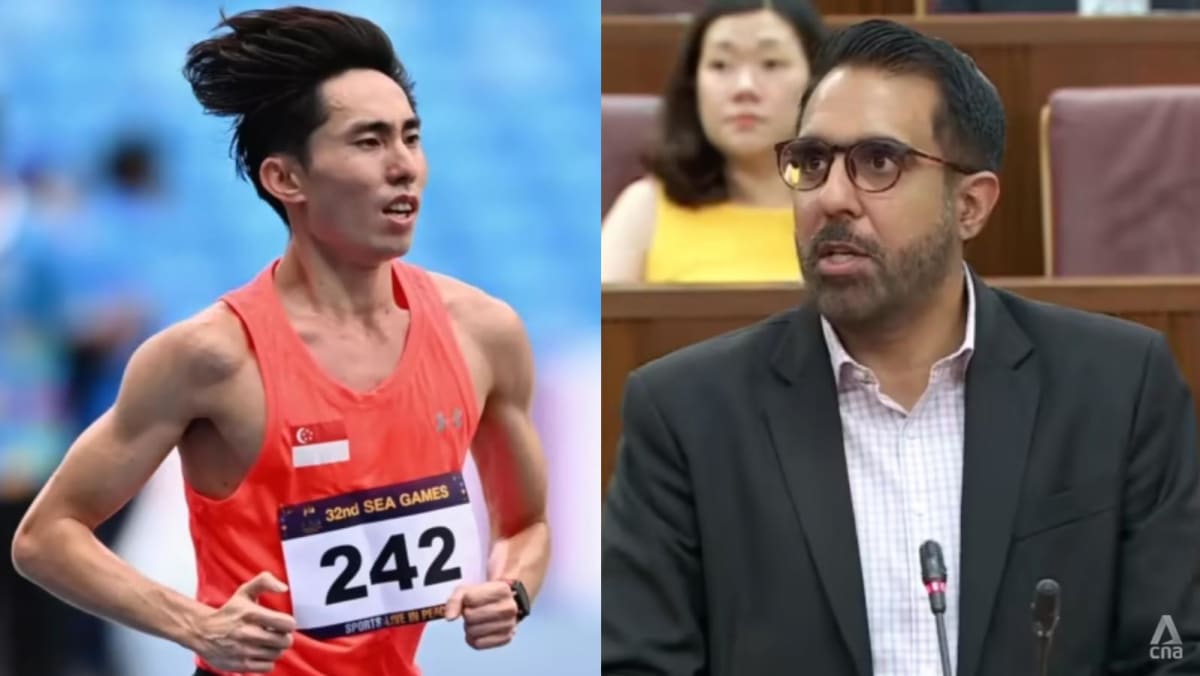
Mr Singh acknowledged that SNOC had done much to promote Singapore sports, by bringing sponsors on board and raising the esteem of sports in the minds and hearts of Singaporeans and many parents in a “very big way”.
“But in the eyes of many Singaporeans on the Soh Rui Yong matter, SNOC as the highest sporting body in Singapore comes out looking petty even as many also believe that Rui Yong needs to learn from the past and draw a line and focus on his sporting career,” said the WP secretary-general.
Nominated Member of Parliament (NMP) Mark Chay, who is also a member of SNOC’s marketing committee, clarified that the council’s appeals committee was satisfied with the Singapore Athletics Association’s nomination of Soh to represent Singapore at this year’s SEA Games.
Soh had also signed a letter of undertaking to abide by the association’s code of conduct.
But upon returning from the SEA Games, he made disparaging comments about SNOC and his teammates on social media, said Mr Chay.
He said Soh was an athlete who “has been given a second chance and knowingly breaks the undertaking and commitment”.
“I think if Rui Yong is truly sorry, and he really wants to move forward, and wants to be a great ambassador for sports, the door is probably not closed,” said Mr Chay, in response to Mr Singh asking if he would advocate for more dispute resolution mechanisms.
POLITICIANS SHOULD NOT BE DIRECTLY INVOLVED IN SPORTS: PRITAM SINGH
Mr Singh also called on the government to intervene.
“I hope the ministry officials, if not the minister in charge of sports, can intercede to prevent parties from reaching a point where Singapore sport cuts off its nose to spite its own face,” he added.
“Politicians should not be directly involved in sports, if only to facilitate raising the profile of Singapore sports and athletes; generating support from corporates, society and parents; and to bring wisdom into disputes like those involving Soh and SNOC.”
Mr Singh did not say who he was referring to.
“Our sports administrators can afford to take an elevated approach as they have done in the past and be more big-hearted, especially when you consider their collective seniority and contributions to Singapore sports,” he said.
The Leader of the Opposition called for a “more enlightened and mature approach” from all involved.
“(SNOC) does not just hold all the cards, but it’s clearly the party in which the power relationship between athlete and state representation resides can make a massive difference,” Mr Singh added.
He expressed hope that the matter could be resolved amicably, with better engagement by perhaps a mediator from the Ministry of Culture, Community and Youth.
“Our sporting ecosystem is strengthened when we focus on sporting values, sportsmanship and bringing glory to Singapore,” said Mr Singh.
Parliament pays tribute to Tharman Shanmugaratnam on his last sitting day
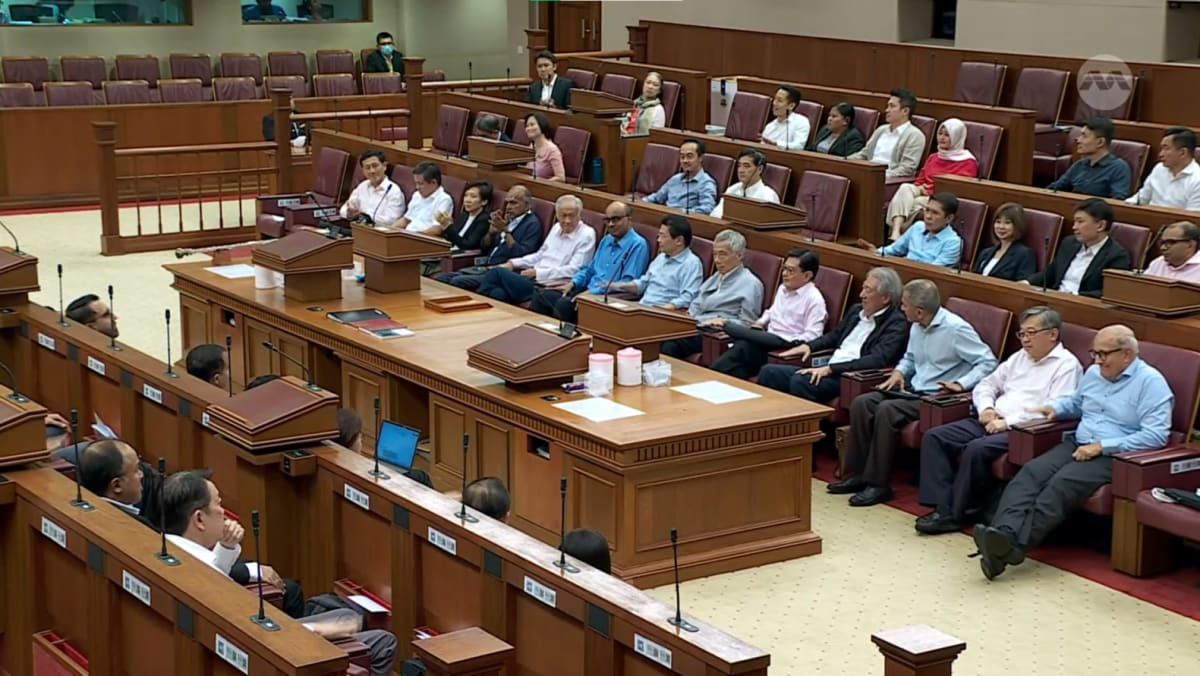
SIMPLIFYING COMPLEX ECONOMIC PRINCIPLES THARMAN’S “GREATEST GIFT”
In a short speech towards the end of Thursday’s sitting, Ms Indranee called Mr Tharman’s ability to simplify complex economic principles as his “greatest gift”.
“I think SM’s (Senior Minister) greatest gift is really in making very complex economic principles sound simple. At least I thought they sounded simple. They sounded very profound; you weren’t quite sure exactly what he was saying, but it sounded like they made a lot of sense,” she said.
“We will miss SM Tharman in this chamber, not least his commanding presence and his erudite speeches,” she added.
“But also (we) will miss his wit and his dry humour. I think, most of all, we will miss a friend and a fellow Member of Parliament.”
Ms Indranee told the House that she and Mr Tharman entered parliament in the same batch in 2001.
Mr Tharman has since held various ministerial appointments, including Minister for Education, Minister for Finance, Deputy Prime Minister, Coordinating Minister for Economic and Social Policies and Senior Minister.
Ms Indranee outlined his various contributions in each role, including seeing Singapore through the global financial crisis of 2007 to 2009 as Finance Minister, removing streaming at primary levels as Education Minister, as well as leading the SkillsFuture programme to encourage lifelong learning and upskilling among Singaporeans in his economic and manpower portfolios.
Mr Tharman also chaired the National Jobs Council during the COVID-19 pandemic to safeguard jobs and create employment and training opportunities for Singaporeans.
RECOGNITION FOR NMPs
Ms Indranee also highlighted that Thursday’s parliamentary sitting marked the end of the term for the current cohort of nine Nominated Members of Parliament (NMPs) and thanked them for their service.
Mr Abdul Samad Abdul Wahab, Ms Janet Ang, Mr Mark Chay, Mr Cheng Hsing Yao, Professor Hoon Hian Teck, Professor Koh Lian Pin, Mr Joshua Thomas Raj, Dr Shahira Abdullah and Dr Tan Yia Swam joined parliament in “most unusual circumstances” in the midst of a global pandemic, said Ms Indranee.
The NMPs covered “several important milestones” during their tenure, she noted.
These include measures to tackle the COVID-19 pandemic and position Singapore for a post-pandemic future, Singapore’s Green Plan, the White Paper on Women’s Development, the repeal of Section 377A and the Constitutional Amendment regarding challenges to the definition of marriage, as well as support for the GST (Goods and Services Tax) Bill.
“They champion causes they care deeply about, ranging from economic growth and employment opportunities, healthcare, sports, and sustainability,” added Ms Indranee.
“They have presented their views passionately and contributed constructively to the robust debates in this House over the last two years. They were also mindful of what this parliament represents and stands for.”
She recalled Mr Cheng’s cut during the Committee of Supply debates earlier this year on “an effective parliament and what that means, as well as the values and principles which underpin it”.
“By their participation in this parliament, they have helped to achieve this current state of affairs,” she added.
“I hope the NMPs will remember their time in parliament fondly, and that they will continue to give close attention to issues of national interest, follow parliamentary proceedings, and contribute to our national building efforts in their personal or professional capacities.”
At least S$480,000 lost in concert ticket scams since January, over 460 in Singapore cheated
They would then contact the scammers via the platform’s in-app messaging function or be redirected to messaging apps such as WhatsApp, Telegram or WeChat to purchase the tickets. When asked if the tickets were authentic, scammers would then provide screenshots and videos of fake tickets or receipts. “To urge victimsContinue Reading
Recovering pope will go to Mongolia, Vatican confirms
VATICAN CITY: Pope Francis will travel to Mongolia at the end of August, the Vatican confirmed on Thursday (Jul 6), indicating that his health is improving well enough after surgery to be able to go to the remotest area he has ever visited. The Vatican issued a detailed schedule forContinue Reading


